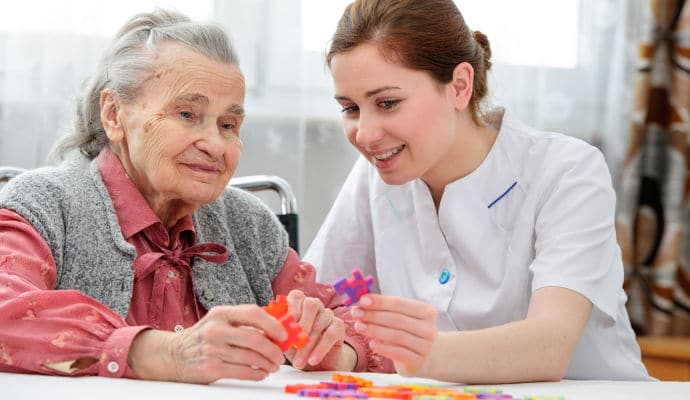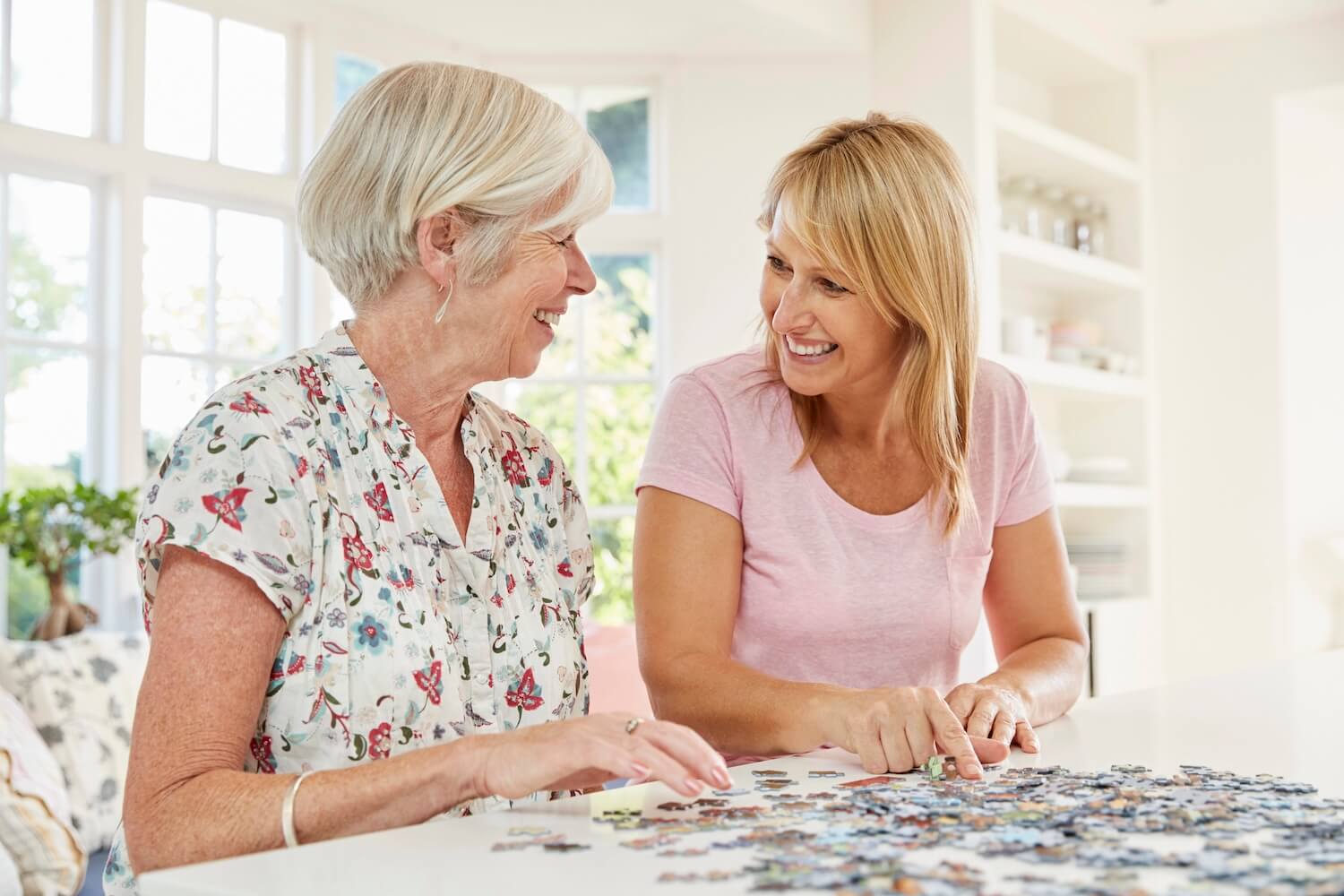Why Family Members Choose Reputable and Specialist Alzheimers Care Charlotte Facilities
Why Family Members Choose Reputable and Specialist Alzheimers Care Charlotte Facilities
Blog Article
Developing a Safe and Supportive Environment for Alzheimer's Treatment
The creation of a secure and supportive atmosphere for individuals with Alzheimer's is extremely important in boosting their top quality of life. This entails not only physical adaptations within the home, such as minimizing threats and incorporating familiar components, yet likewise the application of organized routines and meaningful tasks that cater to their cognitive needs. Furthermore, understanding the psychological and emotional measurements of treatment can substantially affect their feeling of security and link. Checking out these multifaceted methods can reveal critical understandings into reliable caregiving strategies that may change the daily experiences of both caregivers and clients.
Understanding Alzheimer's Needs
Often, people with Alzheimer's illness display a series of needs that need customized approaches to care. As the condition proceeds, cognitive decline materializes in numerous ways, impacting memory, thinking, and even the ability to perform daily activities. Caregivers have to identify these progressing requirements to offer suitable assistance and ensure a higher high quality of life for those influenced.
One vital element of comprehending Alzheimer's demands is identifying the value of routine and familiarity. People often discover convenience in well-known patterns, which can reduce stress and anxiety and confusion. Caregivers need to aim to produce structured daily timetables that integrate purposeful activities aligned with the individual's capabilities and rate of interests.
Additionally, effective communication is paramount. People with Alzheimer's might struggle to express themselves or comprehend complicated language. Caretakers must employ straightforward, clear language, use non-verbal cues, and practice active listening to foster understanding and connection.
Caregivers need to urge engagement in area tasks or family events, advertising a feeling of belonging and objective. Recognizing these varied needs is necessary for creating a helpful treatment environment.
Designing a Safe Home
Creating a risk-free home for individuals with Alzheimer's condition is essential to reducing risks and advertising self-reliance. Ensure that paths are clear and well-lit, as correct illumination decreases disorientation and enhances movement.
Incorporating adaptive attributes is likewise vital. Mount grab bars in shower rooms and near stairs, and take into consideration utilizing non-slip floor coverings in damp areas. Additionally, making use of different colors for floorings and wall surfaces can assist in identifying rooms, helping to mitigate confusion.
Knowledge is very important for individuals with Alzheimer's. Personalizing the setting with acquainted things and photographs can strengthen a feeling of belonging and security - Alzheimers Care Charlotte. It is also useful to have actually an assigned location for day-to-day tasks, such as analysis or crafting, which can supply structure to their day
Lastly, implementing a secure outside room enables safe exploration while getting in touch with nature. By attentively creating the home environment, caregivers can substantially boost the quality of life for people living with Alzheimer's illness.
Enhancing Communication Abilities

Non-verbal communication, consisting of facial expressions, gestures, and touch, plays a crucial role in sharing empathy and understanding. Preserving eye get in touch with and a calm attitude can boost the comfort degree of the individual, advertising a feeling of safety and security.
In addition, it is very important to exercise energetic listening. This involves being fully existing, revealing persistence, and enabling the person to share themselves without disturbance. Rep may be required; caretakers should be prepared to review subjects or questions, as individuals with Alzheimer's might have a hard time with memory recall.
Furthermore, utilizing aesthetic aids or signs, such as photographs or familiar items, can help with recognition and engagement. Ultimately, improving interaction skills has to do with developing count on and producing an environment where people really feel listened to, valued, and understood, therefore enhancing their top quality of life.
Motivating Social Interaction
Cultivating significant social interactions can substantially improve the health of people with Alzheimer's condition. Engaging with others not only assists battle sensations of isolation but additionally boosts cognitive function and psychological health. Structured social activities, such as group games, crafts and arts, or music treatment, create chances for locals to connect with peers and caregivers, which can lead to enhanced state of mind and minimized anxiety.
Producing a welcoming environment that encourages socializing is important. This can be accomplished by organizing public spaces that facilitate communication, such as relaxing seating areas or task spaces. Additionally, integrating acquainted and culturally appropriate activities can spark memories and encourage participation, enabling individuals with Alzheimer's to feel more linked to their previous experiences.
Additionally, caretakers should be educated to recognize and advertise social involvement amongst residents. By prioritizing social communication, we can significantly improve the lives of those living with Alzheimer's, fostering a sense of neighborhood and belonging.
Sustaining Caretaker Wellness

To support caretakers, organizations ought to provide normal training and academic resources to enhance their understanding of Alzheimer's disease and caregiving techniques. Supplying find more info accessibility to break treatment solutions enables caretakers to take essential breaks, minimizing stress and fatigue - Alzheimers Care Charlotte. In addition, cultivating a community via assistance teams can promote psychological sharing and the exchange of useful guidance amongst caretakers, creating a network of shared assistance
Psychological health resources, such as therapy services, can likewise be crucial in dealing with the psychological toll caregiving can take. By focusing on caretaker well-being, we produce a more sustainable caregiving setting that not only profits the caretakers themselves yet likewise improves the general top quality of care received by individuals with Alzheimer's. Ultimately, supporting caretakers is a necessary part in promoting a effective and caring treatment setting.
Final Thought
To conclude, the development of a encouraging and safe atmosphere for individuals with Alzheimer's is important to enhancing their lifestyle. By focusing on security through thoughtful layout, fostering emotional well-being with acquainted aspects, and promoting engagement through structured about his regimens, caregivers can significantly influence the overall experience of those impacted by this condition. Supporting caregiver well-being is essential, as it inevitably contributes to an extra caring and efficient treatment environment.
Repetition might be necessary; caregivers must be prepared to revisit concerns or subjects, as individuals with Alzheimer's may battle with memory recall.

Report this page